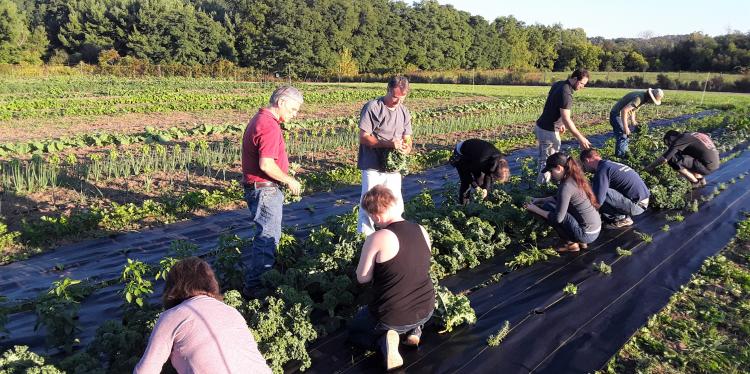Why is the Beginning Farmer Training Program important?
The program inspires and prepares the next generation of farmers to address the pressing issues of local food access and farmland preservation in Western New York and our country. As I see it, the issue is two-fold: most beginning and aspiring farmers do not come from farming backgrounds. Without hands-on experience or institutional knowledge that comes from growing up on a farm, it is hard for outsiders to find employment on farms or to start one. On the other hand, the average age of farmers in the U.S. is 68. In the upcoming decades, there will be a massive turnover or sell-off of prime farmland that could potentially be transitioned to a cadre of prepared next generation farmers.
The Beginning Farmer Training Program accelerates the learning curve of beginning and aspiring farmers, giving them valuable connections, resources and the know-how to take their business idea to the next level. Most importantly, it can help them to avoid costly startup mistakes and to create a solid foundation for their farm business.
How did you adapt the program delivery to meet the challenges created by the COVID-19 pandemic? What new opportunities emerged?
In 2019, the program included 100 hours of hands-on field work, numerous guest speakers and farm tours. We demonstrated seed starting in our greenhouse and turned an acre of CCE’s property into a field lab market garden, so that participants could learn hands-on skills.
In 2020, we needed to shift the program to an online format, as we could not do the hands-on portion. I recorded daily activities on my own farm and made video tutorials, shooting various segments on weed identification or how to properly pack greenhouse trays, edit them and incorporate them into a live online presentation.
Our initial setback turned into an opportunity. I offered weekly online classes on several beginning farmer topics, and to my surprise, the number of participants kept growing, with participants from across New York, from other states, and even a participant from Tanzania. The ongoing pandemic made it clear that there is a strong interest in online beginning farming classes, as well as in-person instruction.
This year, what is the program format?
For 2021, I plan to offer the in-person hands-on training with COVID-19 safety guidelines in place, while continuing to film more instructional videos so that we can create an online version of the course.
What gives you hope for the future of your work, and how do you see the program developing?
I am continually amazed and inspired by the ingenuity of farmers and the exploding interest in farming as a profession. No matter what challenges they face, farmers are incredible problem-solvers. The renewed interest in locally grown food, knowing where food comes from, and innovative small farming practices has only accelerated during the pandemic.
My goal is to prepare the next generation of new farmers so that they can steward our region’s farmlands and continue to innovate and create profitable farm businesses that support our region’s farm families and the local food economy alike.
I am now receiving calls from aspiring farmers from across New York state interested in taking the Beginning Farmer Training Program. One problem is that it’s only offered here in Niagara County. The hands-on learning component is crucial to a full understanding of market farming, so I hope to partner with other CCE offices that could teach the hands-on portion of the class, while participants access a digital Beginning Farmer website full of pre-recorded presentations, know-how videos and regional resources. It would be a hybrid learning course, that could be customized regionally. I think it has a lot of potential and look forward to helping this program expand its reach.
– Cornell Cooperative Extension staff















